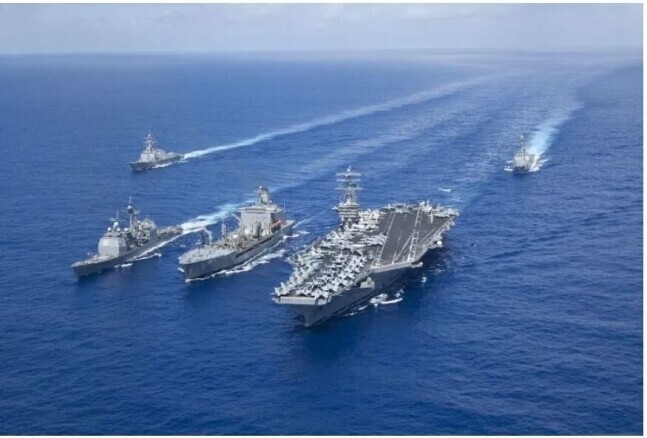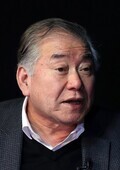hankyoreh
Links to other country sites 다른 나라 사이트 링크
[Column] The US’ “3 demons” and how they’re misguiding foreign policy into a new cold war

If there’s a commonly recurring theme in the White House’s rhetoric about diplomatic policy, it’s the demonization of its geopolitical adversaries. In the 1980s, US President Ronald Reagan dubbed the Soviet Union the “evil empire,” and George W. Bush said that North Korea, Iraq, and Iran were members of an “axis of evil” in his 2003 state of the union address. On July 23 of this year, US Secretary of State Mike Pompeo referred to China as a “Frankenstein” in a speech at the Richard Nixon Presidential Library in which he announced a decoupling from China. That speech, in effect, was the declaration of a new cold war.
Why is it that American leaders repeatedly make mention of monsters and demons, even though those terms are unfit for diplomatic discourse? In his 2009 book “Power Rules,” the late Leslie Gelb, president of the Council on Foreign Relations, argued that the US had created external demons. Gelb went on to explain, "Foreign policy is common sense, not rocket science. But it keeps getting overwhelmed by extravagant principles, nasty politics, and the arrogance of power. These three demons rob officials of choice, which is the core of common-sense policy."
Gelb’s first demon — overemphasis on principles and ideology — is the product of leaning too much on the values of freedom, democracy, anti-Communism, and anti-terrorism. The psychological tendency in Washington to hold these values as sacrosanct produces a binary foreign policy of good and evil, of black and white. Undue emphasis on ideology, to the disregard of the real world, results in policy failure.
The second demon is the nasty political habit in Washington of silence and acquiescence with the government’s foreign policy despite awareness of problems with that policy. As critical views of foreign policy aligned with “lofty American values” are disparaged as “cowardly moderation” and hardline voices increase their bandwidth, the administration and Congress end up joining the bandwagon.
The third and final demon is the arrogant assumption that one is capable of getting whatever one wants. While confidence is needed for dealing with external challenges, Gelb asserted, bravado is mere hubris when it lacks adequate resources or the ability to achieve victory.
All three of the demons that Gelb warned of are evident in Pompeo’s speech. The first is the revival of anti-Communism. I’m referring to Pompeo’s conclusion that the previous policy of inclusion failed to transform China and only strengthened the Chinese Communist Party, turning it into a monster that threatens not only the Chinese people but the free world, including the US. While describing Chinese President Xi Jinping as “a true believer in a bankrupt totalitarian ideology” and China as a new totalitarian and tyrannical state with a “desire for global hegemony,” Pompeo called for an all-out struggle against China, which doesn’t mesh with the Trump’s administration “America first” mantra or Trump’s transactional approach. I wonder how many people actually relate to the radical value proposition of a revival of anti-Communism.
Democratic Party’s tacit assent of Trump’s anti-China policyThere are numerous examples of American figures remaining silent or going along with the Trump administration’s China-bashing. Richard Haass, president of the Council on Foreign Relations, has been one of this policy’s only overt critics. Despite its vocal attacks on Trump, even the Democratic Party has given its tacit assent or, at the most, offered tepid criticism. Since Democrats have based their own foreign policy on freedom, democracy, and human rights, they’re unable to immediately criticize Pompeo’s value-oriented speech. Their response has been limited to cynicism about the Trump administration’s proposal to group allied and friendly countries into a united front against China, given the administration’s prior disinterest in alliance policy. That’s why the anti-China drive bears a resemblance to the McCarthyism of the 1950s.
“The free world must triumph over this new tyranny,” Pompeo said in his speech, asserting that “if the free world doesn’t change, communist China will surely change us.” These words send a chill down one’s spine. Pompeo continued by drawing a distinction between the Chinese Communist Party and the Chinese people and arguing that dissident figures in China, democratic forces in Hong Kong and Taiwan, and even a “new alliance of democracies” should actively pursue the ouster of the Chinese Communist Party.
This is where we see the third demon of which Gelb spoke: to wit, arrogance. Only the Chinese people are capable of deciding to carry out a political revolution. Considering that the Trump administration has promised to stop acting like the world’s policeman, does it have a rationale or justification for such a plan, or the ability to carry it out?
The strength of American foreign policy since the 20th century has been its sophisticated harmonization of the national interest and values. But these three demons have upset that harmony and thrown open the Pandora’s box of a new cold war. Trump’s reelection campaign is no excuse for pulling anti-Communism out of the dustbin of history, responding to perilous diplomatic actions with collective silence and acquiescence, and demonstrating a baffling arrogance. This isn’t the US we thought we knew.

Please direct comments or questions to [english@hani.co.kr]

Editorial・opinion
![[Editorial] Yoon must halt procurement of SM-3 interceptor missiles [Editorial] Yoon must halt procurement of SM-3 interceptor missiles](https://flexible.img.hani.co.kr/flexible/normal/500/300/imgdb/child/2024/0501/17145495551605_1717145495195344.jpg) [Editorial] Yoon must halt procurement of SM-3 interceptor missiles
[Editorial] Yoon must halt procurement of SM-3 interceptor missiles![[Guest essay] Maybe Korea’s rapid population decline is an opportunity, not a crisis [Guest essay] Maybe Korea’s rapid population decline is an opportunity, not a crisis](https://flexible.img.hani.co.kr/flexible/normal/500/300/imgdb/original/2024/0430/9417144634983596.jpg) [Guest essay] Maybe Korea’s rapid population decline is an opportunity, not a crisis
[Guest essay] Maybe Korea’s rapid population decline is an opportunity, not a crisis- [Column] Can Yoon steer diplomacy with Russia, China back on track?
- [Column] Season 2 of special prosecutor probe may be coming to Korea soon
- [Column] Park Geun-hye déjà vu in Yoon Suk-yeol
- [Editorial] New weight of N. Korea’s nuclear threats makes dialogue all the more urgent
- [Guest essay] The real reason Korea’s new right wants to dub Rhee a founding father
- [Column] ‘Choson’: Is it time we start referring to N. Korea in its own terms?
- [Editorial] Japan’s rewriting of history with Korea has gone too far
- [Column] The president’s questionable capacity for dialogue
Most viewed articles
- 1Months and months of overdue wages are pushing migrant workers in Korea into debt
- 2Trump asks why US would defend Korea, hints at hiking Seoul’s defense cost burden
- 3At heart of West’s handwringing over Chinese ‘overcapacity,’ a battle to lead key future industries
- 4[Editorial] Yoon must halt procurement of SM-3 interceptor missiles
- 5[Guest essay] Maybe Korea’s rapid population decline is an opportunity, not a crisis
- 6Fruitless Yoon-Lee summit inflames partisan tensions in Korea
- 7Dermatology, plastic surgery drove record medical tourism to Korea in 2023
- 8First meeting between Yoon, Lee in 2 years ends without compromise or agreement
- 91 in 3 S. Korean security experts support nuclear armament, CSIS finds
- 10AI is catching up with humans at a ‘shocking’ rate